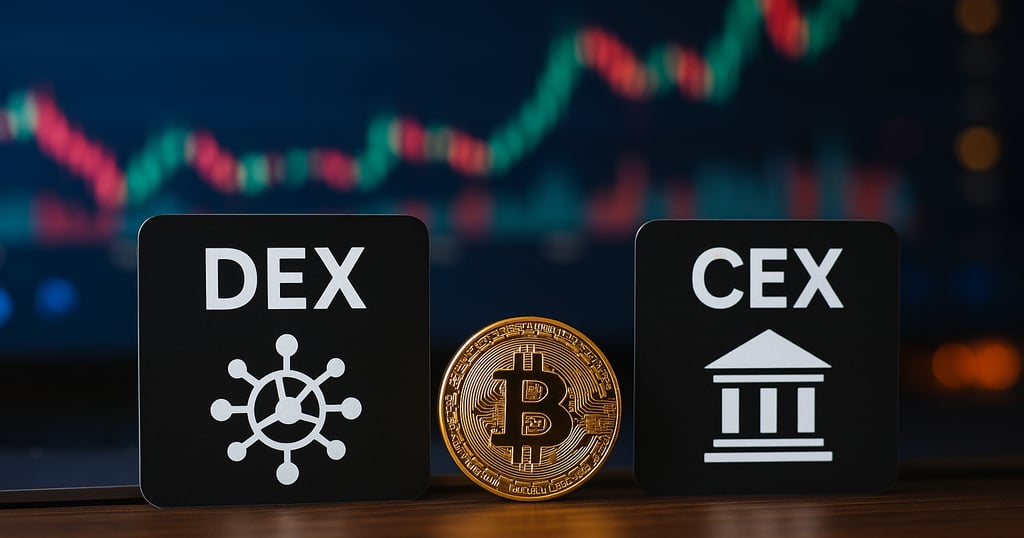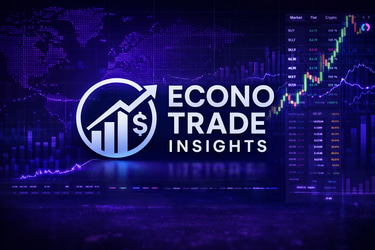Centralized vs Decentralized Exchanges: Understanding the Crypto Market Landscape
10/23/20254 min read


What Are Centralized Exchanges?
Centralized exchanges (CEXs) are pivotal platforms in the cryptocurrency market, acting as intermediaries between buyers and sellers. These exchanges facilitate the trading of various cryptocurrencies by providing a user-friendly interface, essential trading pairs, and significant liquidity. By aggregating a large number of users, CEXs can ensure smooth transactions and a robust trading environment, making them attractive for both novice and experienced traders.
CEXs operate on a centralized model, meaning they maintain control over users' funds and private keys. This structure allows for quicker transaction speeds and an enhanced user experience. Popular exchanges like Binance and Coinbase have set the standard in the industry by offering numerous pairs and streamlined trading processes. They often provide additional services such as margin trading, futures contracts, and staking options, which contribute to user engagement and investment diversification.
Security is a paramount concern for CEXs, prompting them to adopt various measures to protect users from potential threats. Most exchanges use advanced security protocols, including two-factor authentication (2FA), encryption techniques, and cold storage for the majority of their assets. Despite these efforts, centralized exchanges are still vulnerable to cyber attacks and regulatory scrutiny. Consequently, the cryptocurrency community continues to debate the balance between regulatory oversight and user autonomy.
The regulatory landscape is constantly evolving, impacting the operations of CEXs. Governments worldwide are instituting guidelines to ensure compliance, which can affect how these platforms function and interact with users. As the market matures, it is essential for CEXs to navigate these regulations while maintaining user convenience and access to cryptocurrency trading.
Ultimately, the combination of user convenience, extensive services, and traction among traders makes centralized exchanges a popular starting point for those entering the cryptocurrency space, paving the way for a deeper understanding of the alternatives provided by decentralized exchanges.
What Are Decentralized Exchanges?
Decentralized exchanges (DEXs) represent a significant innovation in the cryptocurrency market, facilitating transactions through a peer-to-peer trading process. Unlike centralized exchanges (CEXs), DEXs operate without a central authority, enabling users to trade directly with one another. This system relies heavily on blockchain technology, particularly smart contracts found on platforms such as Ethereum, to automate and secure the trading processes.
One of the fundamental advantages of DEXs is the level of control they offer users over their assets. Participants maintain direct ownership of their cryptocurrencies, with no need to deposit funds into a centralized wallet. This eliminates risks associated with storage on centralized platforms, where funds may be vulnerable to hacking or withdrawal limitations. Consequently, DEXs have gained traction as a safer alternative for traders concerned about security.
Furthermore, DEXs enhance user privacy, allowing trades to occur anonymously without requiring personal information often demanded by centralized exchanges. This feature attracts a growing segment of the user base who value their financial privacy amid increasing surveillance and regulatory scrutiny in the cryptocurrency space.
The rise of DEXs has become particularly pronounced during periods of market volatility, where traders seek more autonomy. Users are drawn to decentralized platforms due to their resilience to outages and restrictions that may occur in traditional exchanges during high traffic. Additionally, DEXs frequently offer a wider variety of trading pairs, especially for emerging tokens, providing enthusiasts with more opportunities for market engagement.
As the crypto landscape continues to evolve, decentralized exchanges are likely to play an integral role, catering to users who prioritize security, privacy, and direct control over their trading activities. Their growth reflects a broader shift towards decentralized financial systems, representing a transformative step in how individuals interact with cryptocurrencies.
Key Differences Between Centralized and Decentralized Exchanges
The cryptocurrency market presents two primary types of exchanges: centralized exchanges (CEXs) and decentralized exchanges (DEXs). Each platform operates under distinct mechanisms that greatly influence user experience, transaction speed, fees, security, and regulatory compliance.
Centralized exchanges function as intermediaries, facilitating trades between buyers and sellers. This structure often allows for a faster transaction process and a generally user-friendly experience, particularly for newcomers in the crypto space. CEXs typically trade a broader selection of cryptocurrencies and feature enhanced liquidity. However, they also present potential risks concerning security breaches; centralized custody of users' funds can lead to vulnerabilities. Moreover, CEXs are usually subjected to regulatory oversight, which may be perceived as a pro or con according to individual perspectives on compliance.
In contrast, decentralized exchanges prioritize user control and privacy, as they do not store user funds or personal data. Transactions typically occur directly on the blockchain, offering enhanced security against hacks. Furthermore, DEXs operate without intermediaries, instilling a sense of autonomy among users and supporting various cryptocurrencies. However, given their nascent development, these exchanges may encounter issues such as lower liquidity, longer transaction times, and a steeper learning curve for less experienced traders. Additionally, DEXs may experience higher fees during peak congestion periods due to network demand.
Recent trends indicate a growing preference for decentralized exchanges among savvy traders who prioritize security and sovereignty over their assets. As the crypto landscape evolves, understanding these key differences between centralized and decentralized exchanges will empower traders to align their choice of platform with their unique trading styles, risk tolerance, and long-term investment strategies.
Choosing the Right Exchange for Your Crypto Trading Needs
Selecting the right exchange for cryptocurrency trading is critical to ensuring a favorable trading experience and optimizing investment outcomes. When choosing between centralized and decentralized exchanges, several factors come into play. One primary consideration is the user interface; an intuitive design promotes ease of navigation, particularly for beginners. A platform that simplifies trading activities can significantly enhance user experience and satisfaction.
Security is another pivotal factor to consider. Cryptocurrency markets are susceptible to hacking and fraud, so it is essential to evaluate the security protocols employed by the exchange. Look for exchanges that offer robust security features, such as two-factor authentication, cold storage for assets, and a transparent history of security practices. A secure platform not only protects investors’ funds but also fosters trust in the exchange’s reliability.
Asset availability is an important consideration as well. A diversified range of cryptocurrencies ensures that traders can access various investment opportunities within a single platform. Furthermore, liquidity is a crucial aspect of trading; higher liquidity typically enables faster transaction times and better price stability. Therefore, it is advisable to assess the trading volume of the assets offered to ensure you can execute trades efficiently.
Customer support should also be a significant factor in your decision-making process. Reliable customer service can assist traders with issues that may arise during trading, allowing for a smoother experience overall. Look for exchanges that provide multiple channels of support, including live chat, email, and comprehensive FAQs.
Considering these factors, https://www.okx.com/ stands out as an excellent choice for beginners. Its user-friendly interface, strong security measures, diverse asset offerings, and responsive customer service make it a preferred option for many new traders. To enhance your crypto trading experience further, consider exploring GO AI-ACADEMY, which can equip you with the knowledge and skills required to navigate the ever-evolving crypto market effectively.
EconoTrade Insights
Learn. Trade. Grow.
Empowering financial freedom through smart education and trusted tools.
© 2025 ECONO TRADE INSIGHTS. All rights reserved.
About - https://econotradeinsights.com/about-us-financial-blogging
Contact - econotradeinsights@gmail.com
Disclaimer - https://econotradeinsights.com/disclaimer
Terms & Conditions - https://econotradeinsights.com/terms-and-conditions
